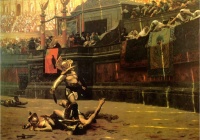Pollice verso
From The Art and Popular Culture Encyclopedia

|
Related e |
|
Featured: |
Pollice verso or verso pollice is a Latin phrase, meaning "with a turned thumb", that is used in the context of gladiatorial combat. It refers to the hand gesture used by Ancient Roman crowds to pass judgment on a defeated gladiator.
The type of gesture described by the phrase pollice verso is unclear. From the historical and literary record it is uncertain whether the thumb was turned up, turned down, held horizontally, or concealed inside the hand to indicate positive or negative opinions.
Popularly, it is assumed that "thumbs down" was the signal that a defeated gladiator should be condemned to death; "thumbs up", that he should be spared.
Painting
The notion of the pollice verso thumb signal was brought to popular attention by a 1872 painting by French history painter Jean-Léon Gérôme titled "Pollice Verso" (usually translated into English as "Thumbs Down"). It is a large canvas that depicts the Vestal Virgins signifying death to a fallen gladiator in the arena.

